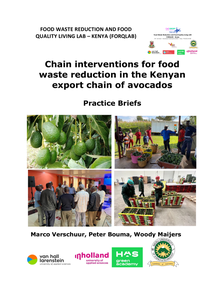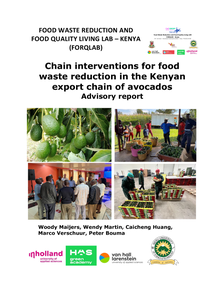This study proposes a systematic value chain approach to helping businesses identify and eliminate inefficiencies. The authors have developed a robust framework, which food-sector entrepreneurs can use to increase profitability of an existing business or to create new profitable opportunities. The value chain approach provides win-win opportunities for players within the value chain. To test the robustness of the framework, the authors use food waste as an example of a critical inefficiency and apply it to two different food sector business cases, each operating in diverse conditions. Because the suggested framework addresses the core elements and parameters for the existence and competitiveness of a business, the model can be adapted to other sectors.
DOCUMENT

Circularity and recycling are gaining increased attention, yet the amount of recycled plastic applied in new products remains low. To accelerate its uptake by businesses, it will be useful to empirically investigate the barriers, enablers, needs and, ultimately, requirements to increase uptake of recycled plastic feedstock for the production of new plastic products. During the six focus group sessions we conducted, a value chain approach was used to map the factors that actors face regarding the implementation of recycled materials. The identified factors were structured based on three levels: determining whether a certain factor acted as a barrier or enabler, identifying the steps in the value chain that the factor directly affected and the category it could be subdivided into. The results were then further processed by translating the (rather abstract) needs of businesses into (specific) requirements from industry. This study presented eight business requirements that require actions from other actors in the value chain: design for recycling, optimised waste processing, standardisation, material knowledge, showing possibilities, information and education, cooperation, and regulation and government intervention. The main scientific contributions were the value chain perspective and the applied relevance of the findings. Future studies may delve deeper into the individual factors identified.
MULTIFILE

With this project we strived to contribute to structural reduction of post-harvest food losses and food quality improvement in the Kenyan avocado and dairy value chains through the application of technical solutions and tools as well as improved coordination in those food chains. The consortium had four types of partners: 1. Universities (2 Kenyan, 4 Dutch), 2. Private sector actorsin those chains, 3. Organisations supporting those chains, and 4. Network partners. The applied research has been implemented in cooperation with all partners, whereby students at involved universities conducted most of the field studies and all other consortium partners support and interact depending on the phases.The FORQLAB project targeted two areas in Kenya for both commodities, a relatively well-developed chain in the central highlands and a less-develop chain in Western-Kenya. The research methods were the business to business and multi-stakeholder (living lab) approaches to increase the potential for uptake of successful interventions in the chain. The project consisted of four phases: 1. Inventory and inception, 2. Applied research, 3. Spreading research outputs through living lab networks, 4. Translation of project output in curricula and trainings. The outcomes were: two knowledge exchange platforms (Living Labs) supported with some advice for sustainable food loss reduction, a research agenda, proposals for ICT and other tech solutions and an implementation strategy; communication and teaching materials for universities and TVETs; and knowledge transfer and uptake.
MULTIFILE

Analyse the results from a representative selection of the supply chain studies for school feeding programmes in Kenya, Ghana and Mali, and make specific suggestions for interventions that can efficiently include SHF in the supply chains.
DOCUMENT

Purpose: The purpose of this study is to find determinants about risk resilience and develop a new risk resilience approach for (agricultural) enterprises. This approach creates the ability to respond resiliently to major environmental challenges and changes in the short term and adjust the management of the organization, and to learn and transform to adapt to the new environment in the long term while creating multiple value creation. Design/methodology: The authors present a new risk resilience approach for multiple value creation of (agricultural) enterprises, which consists of a main process starting with strategy design, followed by an environmental analysis, stakeholder collaboration, implement ESG goals, defining risk expose & response options, and report, learn & evaluate. In each step the organizational perspective, as well as the value chain/area perspective is considered and aligned. The authors have used focus groups and analysed literature from and outside the field of finance and accounting, to design this new approach. Findings: Researchers propose a new risk resilience approach for (agricultural) enterprises, based on a narrative about transforming to multiple value creation, founded determinants of risk resilience, competitive advantage and agricultural resilience. Originality and value: This study contributes by conceptualizing risk resilience for (agricultural) enterprises, by looking through a lens of multiple value creation in a dynamic context and based on insights from different fields, actual ESG knowledge, and determinants for risk resilience, competitive advantage and agricultural resilience.
DOCUMENT

This booklet presents the practice briefs (popular papers) of master and bachelor theses and business assignments of students at three Dutch Universities of Applied Sciences: Van Hall Larenstein (VHL), InHolland and HAS Green Academy, and Meru University of Science and Technology in Kenya. All theses and business assignments were commissioned through the researchproject entitled “Food Waste Reduction and Food Quality Living Lab (FORQLAB)” in Kenya.
MULTIFILE

This publication the avocado advisory report which is based on popular papers (practice briefs) of master and bachelor theses and business assignments of students at three Dutch Universities of Applied Sciences: Van Hall Larenstein (VHL), InHolland and HAS Green Academy, and Meru University of Science and Technology in Kenya. All 23 theses and business assignments were commissioned through the research project entitled “Food Waste Reduction and Food Quality LivingLab (FORQLAB)” in Kenya.
MULTIFILE

In recent years there has been much emphasis on 'research waste' caused by poor question selection, insufficient attention to previous research results, and avoidable weakness in research design, conduct and analysis. Little attention has been paid to the effect of inadequate development of interventions before proceeding to a full clinical trial. We therefore propose to enrich the development phase of the MRC Framework by adding crucial elements to improve the likelihood of success and enhance the fit with clinical practice METHODS: Based on existing intervention development guidance and synthesis, a comprehensive iterative intervention development approach is proposed. Examples from published reports are presented to illustrate the methodology that can be applied within each element to enhance the intervention design.
DOCUMENT

Purpose – Self-efficacy has often been found to play a significant role in healthy dietary behaviours. However, self-efficacy interventions most often consist of intensive interventions. The authors aim to provide more insight into the effect of brief self-efficacy interventions on healthy dietary behaviours. Design/methodology/approach – In the present article, two randomized controlled trials are described. In study 1, a brief self-efficacy intervention with multiple self-efficacy techniques integrated on a flyer is tested, and in study 2, an online brief self-efficacy intervention with a single self-efficacy technique is tested. Findings – The results show that a brief self-efficacy intervention can directly increase vegetable intake and indirectly improve compliance to a diet plan to eat healthier. Originality/value – These findings suggest that self-efficacy interventions do not always have to be intensive to change dietary behaviours and that brief self-efficacy interventions can also lead to more healthy dietary behaviours.
DOCUMENT

Dit eindrapport behandelt het onderzoek van CDM@Airports, gericht op Collaborative Decision Making in de logistieke processen van luchtvrachtafhandeling op Nederlandse luchthavens. Dit project, met een looptijd van ruim twee jaar, is gestart op 8 november 2021 en geëindigd op 31 december 2023. HET PROJECT CDM@AIRPORTS OMVAT DRIE WERKPAKKETTEN: 1. Projectmanagement, dit betreft de algehele aansturing van het project incl. stuurgroep, werkgroep en stakeholdermanagement. 2. Onderzoeksactiviteiten, bestaande uit a) cross-chain-samenwerking, b) duurzaamheid en c) adoptie van digitale oplossingen voor datagedreven logistiek. 3. Management van een living lab, een ‘quadruple-helix-setting’ die fysieke en digitale leeromgevingen integreert voor onderwijs en multidisciplinair toegepast onderzoek.
MULTIFILE
